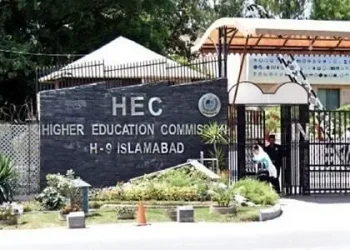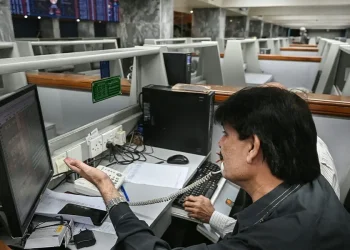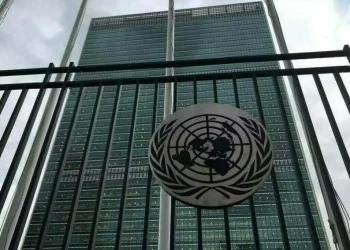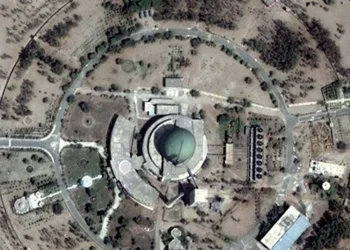Pakistan is grappling with a severe brain drain crisis, witnessing an alarming number of its citizens leaving the country in search of better opportunities and living conditions abroad.
In the first six months of this year alone, over eight lakh Pakistanis emigrated, setting a new record for outward migration. Among these, a significant number of highly trained professionals, including doctors, nurses, engineers, IT experts, and accountants, left the country, exacerbating the brain drain phenomenon.

Pakistan Bureau of Statistics data indicated that 832,000 had left the country by June 2023, with approximately 400,000 being educated and qualified professionals. However, these figures might only represent a portion of the actual exodus, as thousands more are believed to be taking the illegal route to Europe.
The reasons
The reasons behind this mass emigration are multifaceted. Pakistan’s economy has crumbled, leading to record-high inflation and skyrocketing unemployment rates. Political uncertainty has further contributed to the prevailing conditions conducive to brain drain.
Over the past few years, Pakistan has experienced a significant increase in emigration. In the previous year, approximately 765,000 people left the country, with about 100,000 being highly skilled professionals. The majority of emigrants hailed from Punjab province, while around 27,000 are from Jammu and Kashmir.

Notably, the number of emigrants tripled from 2021 to 2022, with 2020 and 2021 being pandemic years marked by international travel restrictions. Saudi Arabia and the United Arab Emirates (UAE) have been the primary destinations for Pakistanis emigrants.
Pakistan allows dual citizenship, which has given rise to corruption issues. Many politicians, bureaucrats and establishment personnel have been accused of siphoning off funds abroad due to this provision, further exacerbating the economic challenges faced by the country. In recent times, Pakistan’s economy has heavily relied on borrowed money, leading to a massive external debt, as projected by the International Monetary Fund (IMF).
The consequence
The consequences of this brain drain are significant. Hundreds of thousands of highly educated individuals are leaving the country each year due to concerns about inflation, unemployment, and overall economic and political uncertainty.
While remittances from Pakistanis abroad provide some economic relief, they are insufficient to address the trade imbalance. Moreover, the country has also failed to develop its textile industry and capitalize on the tech boom, resulting in a loss of talent to foreign shores.
The deteriorating economic conditions have had dire implications for the country’s healthcare system. With public hospitals facing dire conditions and health workers being poorly compensated, many skilled doctors and medical professionals have opted to emigrate to countries like the US.
The ongoing political instability, exemplified by the power struggle between former Prime Minister Imran Khan and the military establishment, further discourages businesses and industries from thriving. The resulting bleak future is prompting a massive exodus of people from Pakistan.
The Boat Tragedy
In addition to the official figures, there is a steady flow of illegal immigrants from Pakistan to European countries. Tragically, many lose their lives attempting to reach Europe via overloaded boats, paying exorbitant fees to human smugglers after first flying legally to Dubai, Egypt, or Libya.
The escalating financial stress has permeated daily life, leading to an increase in marital strife, domestic violence, and mental illness. Children are also affected, with reports of anxiety and even suicidal thoughts. Pakistan is undeniably facing a full-blown crisis, with hopelessness and disillusionment driving hundreds of thousands of its citizens to seek a better life elsewhere.
How to stem brian drain?
To stem the alarming problem of brain drain and to retain valuable talent in the country, a multifaceted approach needs to be taken. Political instability and economic growth are deeply intertwined as political instability gives rise to social turmoil and governance issues. The government should work in a concerted way to tackle the current crisis and implement long-term economic restructuring and social reforms that acknowledge the reality that Pakistan’s population has a significant youth portion of 65 per cent which can either turn out to be a massive liability or an incredible asset.
The establishment of comprehensive economic restructuring and reforms for economic growth are optimal paths to retain, and to some limited extent, attract highly skilled talent. It must be ensured that the country has a conducive environment, which can only be achieved by ensuring good governance, stability, progress and an equitable system that rewards talent and hard work, and access to affordable housing in particular. The skyrocketing prices of real estate have pushed the salaried class out of the housing market unless they have access to hefty savings, which in turn makes migration more alluring.
It is undeniable that skilled Pakistani professionals who are already working in developed countries will prefer to remain where they will be retained by easy paths to permanent migration. Since Pakistan’s economy is at a developmental stage and society is mired in a wide range of issues, the heavy subsidisation of advanced degrees should, instead, be shifted to enhance primary and secondary education, and encouragement of entrepreneurial activities and practical, certified skill development programmes that can function within the current constraints and needs of the domestic economy.
Additionally, indigenously developed solutions, innovation, and value addition are required in the fields of industry, agriculture, manufacturing and finance to enhance productivity, encourage growth, and absorb trained human resources.
The government, relevant stakeholders, and potential investors will need to strategically collaborate to incentivise and facilitate highly skilled professionals to remain in Pakistan by ensuring that they can lead productive, healthy, and rewarding lives within Pakistan.











 American Dollar Exchange Rate
American Dollar Exchange Rate